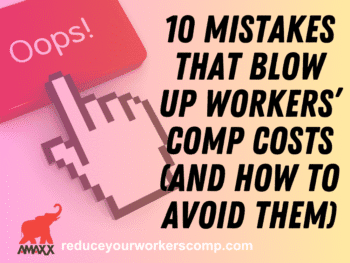What is workers compensation?
Workers compensation is a type of insurance employers are required to have in order to provide benefits to employees injured on the job or who become ill due to on the job exposures. Workers compensation insurance provides the injured employee with medical benefits and partial wage replacement benefits.
Workers Compensation is also called: comp, work comp, workers comp, workmans comp, workmans compensation, and WC.
Where is there workers compensation coverage?
All 50 states, the District of Columbia, American Samoa, Northern Mariana Islands, Guam, the Virgin Islands, and Puerto Rico have workers compensation statutes, each with unique provisions in its workers compensation laws.
Click Link to Access Free PDF Download
Why was workers’ compensation created?
Workers compensation provides guaranteed medical and wage loss benefits to the injured employee under a “no fault” system. This means that the employee does not have to prove the employer is at fault in causing the injury. In exchange for benefits, the employee gives up the right to sue the employer for negligence. The employee is not compensated for any pain and suffering occurring due of the accident.
Companies pay for insurance against this risk and deductibles and premiums usually increase when workers compensation is handled efficiently.
Who are the worker’s compensation players?
Depending on company size and injury complexity there are many players involved in the workers compensation industry:
- Insurance Company
- Insurance Broker/Agent
- Employee
- Third Party Administrator (TPA)
- Employer (also called “the Insured”)
- Service Providers/Vendors
- State Commission or Board
An employer must be familiar with these roles and how they affect the company. Corporate personnel may know what their insurance company does, but few understand the broad duties of a third-party administrator or a medical cost containment vendor.
What are the types of benefits employees receive?
In most states employees receive four primary types of benefits:
- Medical Benefits pay for all types of medical expenses including doctors, hospitals, prescriptions, durable medical equipment, and other medical providers (e.g. nursing services, chiropractors, and physical therapists).
- Vocational Rehabilitation Benefits are designed to assist the employee who is permanently partially disabled and is unable to return to work by assisting the employee to train for another job or to obtain the education needed to perform other work.
- Indemnity Disability Benefits are designed to replace a portion of the wages lost when the employee cannot work due to an injury. Indemnity benefits are calculated as a percentage of the employee’s average weekly wage.
- Death Benefits are paid to the surviving spouse, dependent children, or other dependents of an employee who is killed on the job or dies as a result of an occupational illness.
What are the types of indemnity disability benefits?
In most jurisdictions, indemnity benefits can be broken down into four primary types:
- Temporary total disability (TTD) benefits are the most common. The injured worker receives on a weekly or bi-weekly basis a portion (two-thirds in most jurisdictions) of the average weekly wage until the employee is able to return to work in modified or full time duty.
- Temporary partial disability (TPD) benefits are awarded when the injured worker is able to return to work part time or at a reduced rate of pay. TPD benefits are provided to make up a portion of the lost income until the employee is able to return to work full time.
- Permanent partial disability (PPD) benefits occur when an employee is partially disabled due to the injury and permanent partial disability is paid to compensate the employee for loss of future earning capacity.
- Permanent total disability (PTD) benefits pay the employee who receives a very severe injury and is unable to return to work in any capacity. Benefits are paid, either for a set number of weeks or for life, depending on state law.
Who determines what types of injuries are covered?
State laws determine what types of injuries are covered and not covered. In some states, employers may pay for mental injuries. Employee intoxication may void the responsibility to pay compensation.
FREE DOWNLOAD: “Step-By-Step Process To Master Workers’ Comp In 90 Days”
How do insurance companies and third party administrators (TPA) categorize claims?
On the incident report, insurance companies and TPAs categorize workers compensation claims as:
- Medical Only
- Lost Time
- Catastrophic
- Enhanced Medical
- Occupational Disease
These categories are further subdivided into types of disabilities, kinds of injuries, what to include in the loss report, the details of a company’s workers compensation claims and costs paid as reported in the “loss run” or “loss report” using the paid + reserved = incurred formula.
Where can I find more information?
Workers’ compensation laws vary from state to state and territory jurisdiction. Our guidebook gives an excellent overview of what employers are subject to and discusses certain quirks in the system. Knowing these details help management make company-wide business decisions equaling big savings. Read more: http://wcmanual.com/workers-comp-cost-reduction-guide-book/
Author Michael B. Stack, CPA, Principal, Amaxx Risk Solutions, Inc. is an expert in employer communication systems and part of the Amaxx team helping companies reduce their workers compensation costs by 20% to 50%. He is a writer, speaker, and website publisher. www.reduceyourworkerscomp.com. Contact: mstack@reduceyourworkerscomp.com.
©2014 Amaxx Risk Solutions, Inc. All rights reserved under International Copyright Law.
WORK COMP CALCULATOR: http://www.LowerWC.com/calculator.php
MODIFIED DUTY CALCULATOR: http://www.LowerWC.com/transitional-duty-cost-calculator.php
WC GROUP: http://www.linkedin.com/groups?homeNewMember=&gid=1922050/
SUBSCRIBE: Workers Comp Resource Center Newsletter
Do not use this information without independent verification. All state laws vary. You should consult with your insurance broker, attorney, or qualified professional.
FREE DOWNLOAD: “Step-By-Step Process To Master Workers’ Comp In 90 Days”

























Thanks for your blog on how workers compensation works. As what you explained, workers compensation insurance provides the injured employee with medical benefits. But in my case, I got injured in the office I’m working at and they said they wouldn’t pay for it. With that, I’ll hire an attorney to represent me in the case.